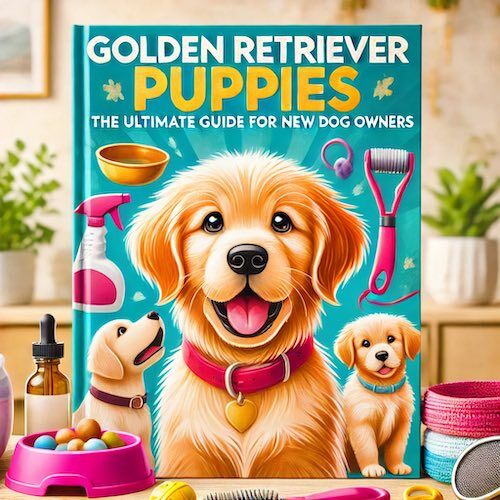
Golden Retriever Puppies: The Ultimate Guide for New Dog Owners
Search Best Golden Retriever Puppy Products Here
Introduction
Golden Retriever puppies are among the most popular and beloved breeds worldwide, known for their friendly demeanor, intelligence, and beautiful golden coats. These traits make them ideal family pets and loyal companions. Their ability to blend seamlessly into various roles such as therapy dogs, service animals, and even hunting companions highlights their versatility and adaptability.
This ultimate guide aims to provide new dog owners with comprehensive information on caring for Golden Retriever puppies, covering their history, characteristics, health care, training, and much more. Whether you’re a first-time dog owner or an experienced pet parent, this guide will help you understand and care for your new furry friend, ensuring a healthy and happy life together.
History and Origins of the Golden Retriever
The Golden Retriever originated in Scotland in the late 19th century. Lord Tweedmouth, a Scottish aristocrat, is credited with developing the breed by crossing a Yellow Retriever with a Tweed Water Spaniel, which is now extinct. The goal was to create a breed that excelled in retrieving game from both water and land. Over time, the breed was refined with the addition of Bloodhound, Irish Setter, and more Tweed Water Spaniel. By the early 20th century, the Golden Retriever had gained recognition for its hunting abilities, and its friendly nature made it a popular family pet.
Golden Retrievers were initially bred for their outstanding retrieving capabilities, making them excellent hunting companions. Lord Tweedmouth meticulously documented his breeding program from 1835 to 1890, aiming to create a breed that was not only skilled in retrieving game but also gentle and trainable, making them suitable for family life.
The breed was officially recognized by The Kennel Club in England in 1911 and by the American Kennel Club in 1932. Since then, Golden Retrievers have become one of the most popular breeds in the United States and around the world. Their versatility has also led them to excel in various roles, including guide dogs for the blind, therapy dogs, and search and rescue dogs. This rich history contributes to their well-rounded and adaptable nature, making them ideal companions for many households.
Golden Retrievers are known for their ability to perform a wide range of tasks with ease. Their strong work ethic, coupled with their gentle temperament, makes them suitable for various working roles. In addition to their hunting and retrieving capabilities, they have been trained for tracking, detection work, and even as emotional support animals. Their history is a testament to their intelligence, versatility, and enduring appeal as one of the most beloved dog breeds worldwide.
Physical Characteristics
Golden Retrievers are known for their striking appearance and physical traits that set them apart from other breeds. Here are some key characteristics:
- Size and Weight: Adult Golden Retrievers typically weigh between 55 to 75 pounds and stand about 21.5 to 24 inches tall at the shoulder. Males are generally larger and heavier than females, but both sexes are sturdy and well-proportioned.
- Coat and Colors: They have a dense, water-repellant double coat that comes in shades of gold, from light to dark golden. Their outer coat is wavy or flat, while the undercoat is soft and thick, providing insulation against cold and wet conditions.
- Face and Expression: Golden Retrievers have a broad head, friendly and intelligent eyes, and a characteristic smile that exudes warmth and friendliness. Their ears are medium-sized and hang down close to their cheeks, and their tails are long and feathery, adding to their overall elegant appearance.
The overall build of a Golden Retriever is one of balance and symmetry. They possess a strong and muscular body that enables them to perform a variety of tasks, from fetching and swimming to agility sports. Their gait is smooth and powerful, with a ground-covering stride that showcases their athleticism.
Golden Retrievers’ expressive eyes, often dark brown, reflect their intelligent and gentle nature. The characteristic Golden Retriever smile is not just a myth; their friendly disposition is often visible in their open and welcoming expression, making them endearing to everyone they meet.
Their coats require regular grooming to maintain their beauty and health. The double coat not only provides protection against the elements but also plays a role in regulating their body temperature. Regular brushing helps to reduce shedding and keeps their coat in good condition. The rich golden color of their coat is one of their most distinctive and admired features, making them easily recognizable and loved by many.
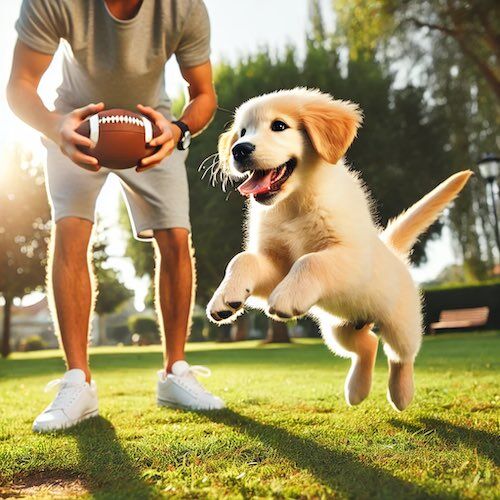
Personality and Temperament
Golden Retrievers are renowned for their excellent temperament, making them ideal pets for a variety of households. Key traits include:
- Friendly: Golden Retrievers are sociable and get along well with people and other animals. They are known for their gentle nature and their ability to form strong bonds with their families.
- Intelligent: Their high intelligence makes them easy to train and eager to please. They excel in obedience training and are often used as service and therapy dogs due to their ability to learn complex tasks.
- Affectionate: These dogs are known for their loving nature and enjoy spending time with their human companions. They are often described as “people dogs” because they thrive on human interaction and love being part of family activities.
- Energetic: Golden Retrievers are active dogs that require regular exercise to stay happy and healthy. They love outdoor activities like running, hiking, and swimming, and they also enjoy playing fetch and other interactive games.
In addition to these traits, Golden Retrievers are also known for their patience and tolerance, especially with children. Their playful and gentle demeanor makes them excellent family pets. They are rarely aggressive and are typically more interested in being friends with everyone they meet. This sociable nature extends to other pets as well, making them a great addition to multi-pet households.
Their loyalty and protective instincts also make them excellent watchdogs, though they are more likely to greet strangers with a wagging tail than with aggression. This combination of traits makes Golden Retrievers one of the most adaptable and well-loved breeds in the world.
Golden Retrievers’ temperament makes them particularly suitable for roles that require a calm and stable demeanor. Their ability to remain composed in various situations makes them excellent therapy dogs, providing comfort and support to people in hospitals, nursing homes, and schools. Their friendly nature and desire to please make them a joy to train and live with, ensuring they are well-behaved and cherished members of any household.
Preparing for Your Golden Retriever Puppy
Before bringing a Golden Retriever puppy home, it’s important to prepare your living space and gather the necessary supplies. Here’s a checklist to help you get started:
- Living Space: Ensure your home is puppy-proofed by removing any hazardous items and securing loose wires. Create a safe, comfortable area for your puppy to rest and play. Consider using baby gates to block off unsafe areas and to help with housebreaking.
- Essential Supplies: You’ll need a variety of items, including a bed, food and water bowls, toys, grooming tools, a collar and leash, and a crate for training and travel. Ensure that all supplies are appropriate for the size and breed of your puppy.
- Choosing a Veterinarian: Find a local veterinarian experienced with large breeds and schedule an initial check-up for your puppy. It’s crucial to establish a good relationship with your vet and to keep up with regular health check-ups and vaccinations.
Additionally, consider investing in puppy training classes and socialization opportunities. Exposing your puppy to various environments, people, and other animals during the critical socialization period will help them grow into a well-adjusted adult dog. It’s also beneficial to set up a routine and establish house rules before your puppy arrives, ensuring consistency and clarity from the start.
Proper preparation also includes setting up a feeding area and designating specific potty spots outside. Consistency in these areas will help your puppy adjust to their new home more quickly. If possible, try to arrange for some time off work when your puppy first arrives to help them settle in and establish a bond with you.
Creating a safe and stimulating environment for your puppy is essential for their development. Puppies are naturally curious and will explore their new surroundings, so it’s important to remove any potential hazards such as small objects that could be swallowed, toxic plants, and electrical cords. Providing a variety of toys and chews can help keep them entertained and prevent destructive behaviors.
Establishing a daily routine that includes feeding times, potty breaks, play sessions, and training can help your puppy feel secure and understand what is expected of them. Consistency in your interactions and routines will help your puppy learn faster and develop good habits. Enrolling in a puppy kindergarten class can also provide valuable socialization and basic training in a controlled environment, setting the foundation for a well-behaved adult dog.

Top 5 Best Golden Retriever Dog Food Brands
Nutrition and Feeding
Proper nutrition is crucial for the health and growth of your Golden Retriever puppy. Here are some guidelines to follow:
- Puppy Food: Choose a high-quality puppy food specifically formulated for large breeds. Look for food with balanced nutrients, including proteins, fats, carbohydrates, vitamins, and minerals. Large breed puppy food helps support proper growth and development and reduces the risk of skeletal problems.
- Feeding Schedule: Puppies should be fed three to four times a day until they are about six months old. After that, you can switch to two meals a day. Consistent meal times help regulate digestion and potty schedules.
- Portion Control: Follow the feeding guidelines on the dog food packaging and adjust based on your puppy’s weight and activity level. Avoid overfeeding, as Golden Retrievers are prone to obesity. Monitor your puppy’s body condition and consult with your vet to ensure proper growth.
- Hydration: Ensure your puppy has access to fresh, clean water at all times. Dehydration can be dangerous, especially for active puppies.
In addition to commercial puppy food, you can introduce healthy treats and snacks in moderation. Avoid feeding your puppy human food, particularly foods that are toxic to dogs, such as chocolate, grapes, and onions.
Proper nutrition goes beyond just feeding. It’s also about understanding the dietary needs specific to Golden Retrievers. For instance, they can be prone to digestive issues, so introducing new foods gradually and monitoring their reaction is essential. A balanced diet rich in omega-3 and omega-6 fatty acids can also support their skin and coat health, reducing the risk of allergies and infections.
It’s also beneficial to establish a feeding routine that includes mealtimes and feeding locations. This helps in training and ensures that your puppy understands their eating schedule. Regularly weigh your puppy to ensure they are growing at a healthy rate and adjust food portions as necessary. Consulting with your vet about any dietary changes or concerns will ensure your puppy’s nutritional needs are always met.
Proper nutrition also involves understanding the ingredients in your puppy’s food. Look for high-quality proteins such as chicken, lamb, or fish as the main ingredient, and avoid foods with fillers like corn and soy. Whole grains, vegetables, and fruits can provide essential vitamins and minerals. Some Golden Retrievers may have food allergies or sensitivities, so be attentive to any signs of digestive upset or skin issues, and work with your vet to identify and manage any dietary restrictions.
Feeding your puppy in a quiet and consistent location can help create a calm eating environment. Avoiding table scraps and excessive treats will help maintain a healthy weight and prevent bad habits. Training your puppy to sit and wait before eating can also reinforce good manners and control around food.
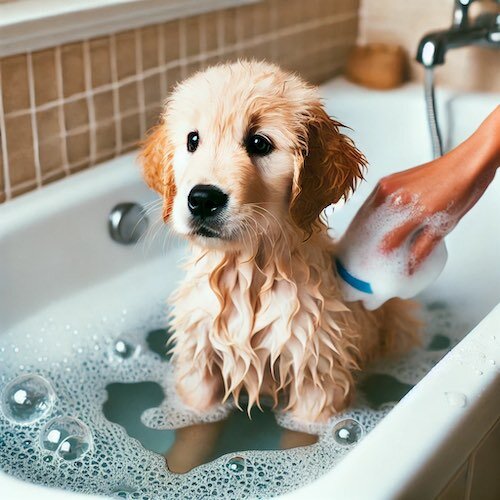
Grooming Needs
Golden Retrievers require regular grooming to keep their coat healthy and free of tangles. Here are some grooming tips:
- Brushing: Brush your puppy’s coat several times a week to prevent matting and tangles. Use a slicker brush and an undercoat rake for best results. During shedding season, daily brushing may be necessary to manage their heavy shedding.
- Bathing: Bathe your Golden Retriever every few months or as needed using a gentle dog shampoo. Be sure to dry their coat thoroughly to prevent skin issues. Overbathing can strip their coat of natural oils, so bathe only when necessary.
- Ears and Eyes: Clean your puppy’s ears weekly to prevent infections and wipe their eyes daily to remove tear stains. Use a vet-recommended ear cleaner and soft cloth for cleaning.
- Nail Trimming: Trim your puppy’s nails regularly to prevent overgrowth and discomfort. If you’re unsure how to do this, ask your veterinarian or a professional groomer for help. Long nails can cause pain and walking issues.
- Dental Care: Brush your puppy’s teeth several times a week using a dog-specific toothbrush and toothpaste to prevent dental problems. Dental chews and toys can also help maintain oral health.
Regular grooming sessions are also a great opportunity to check your puppy for any signs of health issues, such as skin infections, lumps, or parasites. Early detection of potential problems can prevent more serious health issues down the line. Additionally, making grooming a positive experience from a young age helps your puppy get accustomed to being handled, reducing stress during grooming sessions as they grow older.
In addition to the basics, consider scheduling regular professional grooming appointments. Professional groomers can help with tasks that are more challenging to do at home, such as thorough ear cleaning, nail trimming, and ensuring your Golden Retriever’s coat is in top condition. They can also provide valuable advice on maintaining your puppy’s coat between visits.
Training your puppy to enjoy grooming sessions can make the process easier for both of you. Start by gently handling your puppy’s paws, ears, and mouth from a young age, rewarding them with treats and praise for staying calm. Gradually introduce grooming tools and activities, such as brushing and nail trimming, to build their comfort and tolerance.
Grooming is also a time to bond with your puppy and reinforce positive behaviors. Regular brushing not only keeps their coat healthy but also strengthens your relationship through gentle, consistent handling. Use grooming sessions to check for any signs of health issues, such as unusual lumps, skin irritations, or parasites, and address any concerns promptly with your vet.
Health and Wellness
Maintaining your Golden Retriever puppy’s health is essential for their overall well-being. Here are some key aspects of health care:
- Vaccinations: Ensure your puppy receives all necessary vaccinations to protect against common diseases. Follow your veterinarian’s recommended vaccination schedule. Core vaccines typically include distemper, parvovirus, adenovirus, and rabies.
- Parasite Prevention: Use preventive treatments for fleas, ticks, and heartworms as advised by your veterinarian. Regularly check your puppy for signs of parasites and follow a year-round prevention plan.
- Spaying/Neutering: Discuss spaying or neutering with your veterinarian. This procedure can help prevent certain health issues and unwanted behaviors. It is typically recommended to wait until your puppy is at least six months old, but your vet can provide specific advice based on your puppy’s health and development.
- Regular Check-Ups: Schedule regular veterinary check-ups to monitor your puppy’s health and catch any potential issues early. Annual wellness exams are essential, and more frequent visits may be necessary during your puppy’s first year.
- Common Health Issues: Be aware of common health problems in Golden Retrievers, such as hip dysplasia, elbow dysplasia, and certain heart conditions. Regular vet visits and proper care can help manage these issues. Maintaining a healthy weight and providing joint supplements can also support their orthopedic health.
In addition to these preventive measures, ensure that your puppy receives proper dental care and a balanced diet to support overall health. Mental stimulation and regular exercise are also critical components of a healthy lifestyle. Providing a safe environment and promptly addressing any health concerns can significantly enhance your puppy’s quality of life and longevity.
Keeping a health journal for your puppy can be beneficial. Record their growth, vaccination dates, any illnesses or injuries, and observations about their behavior and appetite. This information can be invaluable during vet visits and helps you track your puppy’s development over time.
Maintaining your puppy’s health also involves regular monitoring for any signs of illness or discomfort. Be attentive to changes in their eating habits, energy levels, and behavior, as these can be early indicators of health issues. Regular grooming sessions can help you notice any physical changes, such as skin irritations, lumps, or parasites, and address them promptly with your vet.
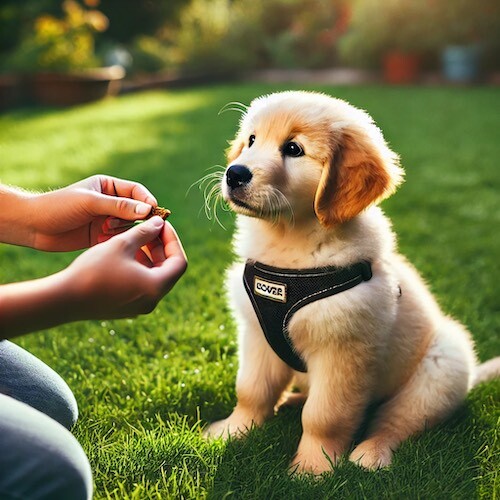
Training Your Golden Retriever Puppy
Training is an essential part of raising a well-behaved Golden Retriever puppy. Here are some training tips:
- Housebreaking: Start housebreaking your puppy as soon as you bring them home. Use positive reinforcement, consistency, and patience. Crate training can be helpful for housebreaking, providing a safe space for your puppy and aiding in establishing a routine.
- Basic Commands: Teach your puppy basic commands like sit, stay, come, and down. Use positive reinforcement techniques, such as treats and praise, to encourage good behavior. Short, frequent training sessions are more effective than long, drawn-out ones.
- Socialization: Expose your puppy to different people, places, and other animals to help them become well-adjusted and confident. Puppy socialization classes can be beneficial. Positive experiences during this critical period are essential for developing a well-rounded dog.
- Leash Training: Teach your puppy to walk on a leash without pulling. Start with short, positive experiences and gradually increase the duration of walks. Use a properly fitted harness to prevent strain on their neck.
Training should always be a positive and rewarding experience for your puppy. Avoid punishment-based methods, as they can lead to fear and anxiety. Instead, focus on building trust and a strong bond through consistent, positive interactions.
Advanced training can include activities like agility, tracking, and protection work, which can provide your Golden Retriever with mental and physical stimulation. Enrolling in obedience classes can also be beneficial, offering structured learning environments and opportunities for socialization.
Training a Golden Retriever should be seen as an ongoing process rather than a one-time effort. Reinforce good behaviors consistently and address undesirable behaviors promptly. Using a clicker can be an effective training tool, providing clear signals to your puppy about the behaviors you want to encourage.
Consistency and patience are key components of successful training. Set clear expectations and follow through with consistent commands and rewards. Golden Retrievers are eager to please and respond well to positive reinforcement, making training a rewarding experience for both you and your puppy.
Exercise and Playtime
Golden Retrievers are active dogs that need regular exercise to stay healthy and happy. Here’s how to ensure your puppy gets enough physical activity:
- Daily Walks: Take your puppy for daily walks to provide physical exercise and mental stimulation. Aim for at least an hour of exercise per day, divided into multiple sessions for young puppies. Gradually increase the duration and intensity as your puppy grows.
- Playtime: Engage in interactive play sessions with your puppy using toys and games. Golden Retrievers enjoy fetch, tug-of-war, and puzzle toys. These activities provide both physical exercise and mental engagement.
- Safe Environment: Ensure that your play area is safe and secure. Supervise your puppy during playtime to prevent accidents or injuries. A fenced yard or a secure dog park can be great places for off-leash play.
In addition to physical exercise, mental stimulation is crucial for Golden Retrievers. Training sessions, puzzle toys, and interactive games can help keep their minds sharp and prevent boredom.
Exercise should be tailored to your puppy’s age and development stage. Young puppies require shorter, more frequent play sessions, while older puppies and adults benefit from more extended and varied activities. Overexertion, especially in young puppies, can lead to joint and bone problems, so always ensure exercise is appropriate for their age and physical condition.
Incorporating a variety of activities into your puppy’s routine can help prevent monotony and keep them engaged. Activities like swimming, hiking, and agility training can provide excellent exercise and are enjoyable for both you and your puppy. Always be mindful of your puppy’s energy levels and provide plenty of rest and recovery time after intense play sessions.
Exercise is also an excellent opportunity to reinforce training and build a strong bond with your puppy. Incorporate basic commands and obedience training into your play sessions to keep your puppy mentally stimulated and reinforce good behavior. Providing a safe and secure environment for exercise ensures that your puppy can play and explore without the risk of injury or escape.
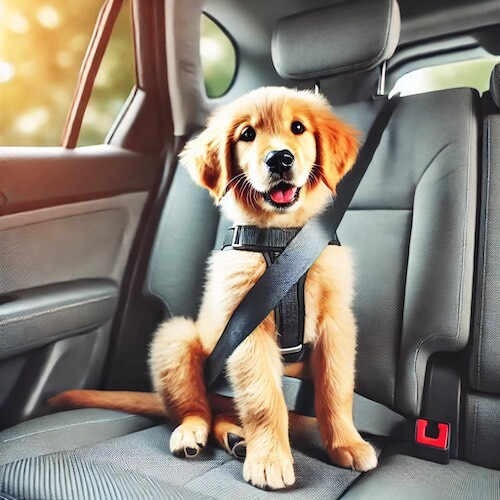
Travel and Safety
Traveling with your Golden Retriever puppy requires careful planning and consideration. Here are some tips for safe and enjoyable travel:
- Car Travel: Use a crate or a dog seatbelt harness to keep your puppy secure while traveling in the car. Take regular breaks for bathroom breaks and water. Introduce your puppy to car rides gradually to prevent anxiety.
- Air Travel: If you plan to fly with your puppy, check the airline’s pet policy and make necessary arrangements. Ensure your puppy is comfortable in their travel crate. Acclimate your puppy to the crate well in advance of your trip.
- Identification: Always have your puppy wear a collar with an ID tag that includes your contact information. Microchipping is also recommended for added security. Ensure the microchip information is registered and kept up-to-date.
- Safety Precautions: Keep your puppy away from dangerous areas, such as busy roads, and avoid leaving them unattended in hot or cold vehicles. Always supervise your puppy in unfamiliar environments and ensure they are properly restrained.
Planning ahead and ensuring that your puppy is comfortable and secure during travel can make the experience enjoyable for both of you. Familiarize your puppy with the travel crate or harness at home, so they associate it with positive experiences. Bring along their favorite toys and bedding to provide comfort and a sense of familiarity during the journey.
For longer trips, ensure you pack all necessary supplies, including food, water, medications, and a first aid kit. Research pet-friendly accommodations and rest stops along your route to ensure your puppy has a safe and comfortable place to stay.
Traveling can be a positive experience for your puppy if introduced gradually and with positive reinforcement. Start with short car rides to familiar places, such as the park or a friend’s house, to build positive associations with travel. Providing treats and praise during and after car rides can help reduce anxiety and make travel more enjoyable for your puppy.
Golden Retriever Puppy Development Stages
Understanding the development stages of your Golden Retriever puppy can help you provide appropriate care and training at each stage. Here’s an overview:
- Neonatal Stage (0-2 weeks): Puppies are born blind and deaf, relying on their mother for nourishment and warmth. During this period, they spend most of their time sleeping and feeding.
- Transitional Stage (2-4 weeks): Puppies begin to open their eyes, hear sounds, and explore their surroundings. Their motor skills improve, and they start interacting with their littermates.
- Socialization Stage (4-12 weeks): This is a critical period for socialization. Puppies learn important social skills from their mother and littermates and start interacting with humans. Exposure to various stimuli during this period is essential for developing a well-adjusted adult dog.
- Juvenile Stage (3-6 months): Puppies become more independent and curious. This is an ideal time for basic training and socialization. They experience rapid growth and begin losing their baby teeth.
- Adolescent Stage (6-12 months): Puppies reach sexual maturity and may exhibit challenging behaviors. Consistent training and positive reinforcement are essential.
Each stage of development presents unique challenges and opportunities. Understanding these stages can help you provide the appropriate support and guidance for your growing puppy. Early training and socialization are crucial, as behaviors learned during the early stages can significantly impact their adult temperament and behavior.
The neonatal stage is a critical time for bonding with the mother and littermates, laying the foundation for social skills. During the transitional stage, puppies begin to develop their senses and start exploring their environment. This is an ideal time to introduce gentle handling and basic human interaction.
The socialization stage is perhaps the most important period for your puppy’s development. Positive experiences with different people, animals, and environments help shape a confident and well-adjusted adult dog. During this time, puppies are more receptive to new experiences and less likely to develop fear-based behaviors.
The juvenile stage is a time of rapid growth and learning. Puppies become more independent and curious, making it an ideal time to introduce basic training and reinforce positive behaviors. Consistent training and socialization during this period can help prevent behavioral issues and ensure your puppy grows into a well-mannered adult dog.
The adolescent stage can be challenging, as puppies reach sexual maturity and may test boundaries. Patience and consistent training are essential during this time to reinforce good behaviors and manage any challenging behaviors. Providing plenty of exercise and mental stimulation can help channel their energy positively.
Understanding Golden Retriever Behavior
Golden Retrievers have unique behavioral traits that new owners should understand to provide the best care:
- Separation Anxiety: Golden Retrievers can be prone to separation anxiety. Gradually acclimate your puppy to being alone for short periods and provide toys to keep them occupied.
- Barking: Golden Retrievers are generally not excessive barkers, but training and socialization can help manage any barking behavior.
- Stubbornness: While Golden Retrievers are intelligent and eager to please, they can also be stubborn. Patience and consistent training are key.
- Chewing: Puppies love to chew. Provide plenty of appropriate chew toys to prevent destructive chewing behaviors.
Understanding and managing these behaviors can help ensure a harmonious relationship with your Golden Retriever. Training should focus on positive reinforcement and building trust, rather than punishment or negative reinforcement.
Separation anxiety can be managed by gradually increasing the time your puppy spends alone and providing plenty of mental and physical stimulation before you leave. Using interactive toys and providing a comfortable and safe space can help reduce anxiety and keep your puppy occupied.
Barking can be managed by identifying the cause and addressing it through training and socialization. Providing plenty of exercise and mental stimulation can help reduce boredom-related barking. Training your puppy to respond to commands such as “quiet” can also be effective.
Stubbornness can be managed through consistent training and positive reinforcement. Golden Retrievers are eager to please and respond well to praise and rewards. Setting clear expectations and being consistent in your training approach can help manage stubborn behavior.
Chewing is a natural behavior for puppies, especially during teething. Providing plenty of appropriate chew toys and supervising your puppy can help prevent destructive chewing. Redirecting your puppy to appropriate toys and praising them for chewing on the right items can reinforce good behavior.
Understanding your Golden Retriever’s behavior and providing appropriate training and support can help ensure a well-behaved and happy dog. Building a strong bond through positive interactions and consistent training can create a lifelong partnership based on trust and mutual respect.
Choosing a Golden Retriever Puppy
Selecting a Golden Retriever puppy involves careful consideration. Here are some tips to help you choose the right puppy:
- Reputable Breeders: Look for reputable breeders who prioritize health, temperament, and responsible breeding practices. Avoid puppy mills and backyard breeders.
- Health Checks: Ensure the puppy has received initial vaccinations and health checks. Ask to see health clearances for the puppy’s parents, particularly for hip dysplasia and heart conditions.
- Temperament: Observe the puppy’s temperament. Look for a puppy that is friendly, curious, and well-socialized.
- Questions to Ask: Ask the breeder questions about the puppy’s health, lineage, and care requirements.
Selecting a puppy from a responsible breeder helps ensure you bring home a healthy, well-adjusted puppy that will be a great addition to your family. Additionally, consider adopting from a rescue organization or shelter, where you can find Golden Retriever puppies or adult dogs in need of a loving home.
When choosing a breeder, look for those who are members of recognized breed clubs and adhere to strict breeding standards. A reputable breeder will provide health guarantees and be transparent about the puppy’s lineage and health history. Visiting the breeder’s facility and meeting the puppy’s parents can provide valuable insight into the puppy’s potential temperament and health.
Observing the puppy’s behavior and interaction with littermates can also help you choose the right puppy. Look for a puppy that is playful, curious, and interacts well with people and other animals. Avoid puppies that show signs of fear or aggression, as these behaviors can indicate potential issues.
Golden Retriever Puppy Activities and Games
Engaging your Golden Retriever puppy in various activities and games helps keep them mentally and physically stimulated. Here are some ideas:
- Interactive Toys: Puzzle toys and treat-dispensing toys can keep your puppy entertained and mentally challenged.
- Training Games: Incorporate training into playtime with games like hide-and-seek, where your puppy has to find you or a hidden treat.
- Fetch and Tug-of-War: These classic games provide physical exercise and strengthen the bond between you and your puppy.
- Agility Training: Set up a mini agility course with tunnels, jumps, and weave poles to provide a fun and challenging activity for your Golden Retriever.
Incorporating a variety of activities and games into your puppy’s routine helps keep them engaged and prevents boredom-related behaviors. Golden Retrievers excel in sports and activities that challenge their minds and bodies, making them excellent candidates for advanced training and competitions.
Providing a mix of physical and mental activities can help channel your puppy’s energy positively and prevent destructive behaviors. Interactive toys and games can provide mental stimulation and keep your puppy engaged when you are not available for direct interaction.
Training games that incorporate basic commands and obedience training can reinforce good behavior and provide valuable mental stimulation. Using treats and praise as rewards can make training sessions enjoyable and effective.
Agility training can provide an excellent outlet for your puppy’s energy and enhance their physical coordination and confidence. Setting up a simple agility course in your backyard can provide hours of fun and exercise for both you and your puppy.
Common Mistakes to Avoid
Avoiding common mistakes can help ensure a positive experience with your Golden Retriever puppy:
- Inconsistent Training: Consistency is key in training. Mixed signals can confuse your puppy and hinder progress.
- Lack of Socialization: Proper socialization is crucial for a well-adjusted dog. Expose your puppy to different environments, people, and animals.
- Overfeeding: Golden Retrievers are prone to obesity. Stick to a feeding schedule and avoid giving too many treats.
- Neglecting Grooming: Regular grooming is essential for a healthy coat. Neglecting grooming can lead to matting and skin issues.
By avoiding these common mistakes, you can provide a stable and nurturing environment for your Golden Retriever puppy, ensuring they grow into a well-behaved and healthy adult dog. It’s also important to educate yourself continually about the breed and remain patient and committed to your puppy’s growth and training.
Consistency in training helps your puppy understand what is expected of them and reinforces good behavior. Establishing clear rules and boundaries from the start can prevent confusion and behavioral issues.
Proper socialization is essential for developing a confident and well-adjusted dog. Expose your puppy to various environments, people, and animals to build positive associations and prevent fear-based behaviors.
Maintaining a healthy weight is crucial for your puppy’s overall health and well-being. Monitor your puppy’s diet and avoid overfeeding or giving excessive treats. Regular exercise and a balanced diet can help prevent obesity and related health issues.
Regular grooming is essential for maintaining your puppy’s coat and skin health. Establish a grooming routine early and stick to it to prevent matting and skin issues. Regular brushing, bathing, and nail trimming can keep your puppy looking and feeling their best.
Conclusion
Welcoming a Golden Retriever puppy into your home is a rewarding experience filled with joy and companionship. By understanding their unique needs and providing proper care, training, and love, you can ensure a happy and healthy life for your new furry friend. This ultimate guide has provided you with the essential information to start your journey as a Golden Retriever owner. Enjoy the adventures and cherish the moments with your delightful Golden Retriever puppy!
